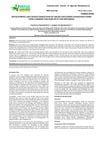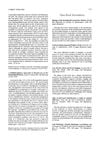 September 2023 in “medRxiv (Cold Spring Harbor Laboratory)”
September 2023 in “medRxiv (Cold Spring Harbor Laboratory)” Long-COVID has diverse, long-term health impacts, especially in young people.
 March 2021 in “Clin-Alert”
March 2021 in “Clin-Alert” The FDA warned about safety issues with remdesivir and tofacitinib, finasteride is linked to suicidality, potent topical corticosteroids increase osteoporosis risk, henna can cause hemolysis in G6PD deficiency, chemotherapeutic agents can cause adverse reactions, drug interactions are common in cancer patients, ketamine can reduce at-risk drinking, high dose of anticholinergics increases dementia risk in Parkinson's patients, and prenatal exposure to second-generation antipsychotics increases pregnancy complications.
21 citations,
January 2021 in “Frontiers in Pharmacology” Thiopurines help treat IBD but require genetic testing to avoid side effects.
 14 citations,
April 2019 in “PLOS ONE”
14 citations,
April 2019 in “PLOS ONE” Skin cancer is common in elderly nursing home residents, with risk factors including being male, having light skin, outdoor work history, and smoking. Regular skin checks are recommended.
 1 citations,
June 2019 in “International Journal of Applied Pharmaceutics”
1 citations,
June 2019 in “International Journal of Applied Pharmaceutics” Nanostructured lipid carriers can effectively repair hair split-ends for over 3 days.
 1 citations,
September 2017 in “Frontiers in Laboratory Medicine”
1 citations,
September 2017 in “Frontiers in Laboratory Medicine” Gut flora changes could potentially indicate depression, but more research is needed.
 41 citations,
June 2010 in “Clinics in Dermatology”
41 citations,
June 2010 in “Clinics in Dermatology” Smoking harms skin health, causing slower wound healing, more wrinkles, and worsening some skin conditions, but may protect against certain others.
 8 citations,
December 2022 in “Nature Reviews Endocrinology”
8 citations,
December 2022 in “Nature Reviews Endocrinology” Sex hormones' effects on COVID-19 are unclear and more research is needed to understand their potential as treatment.
 6 citations,
February 2023 in “Advances in Therapy”
6 citations,
February 2023 in “Advances in Therapy” Baricitinib, a drug for rheumatoid arthritis, atopic dermatitis, and alopecia areata, is generally safe with low risk of major side effects, even in patients with risk factors. It's also effective in promoting hair regrowth in alopecia areata patients.
 5 citations,
May 2023 in “Frontiers in immunology”
5 citations,
May 2023 in “Frontiers in immunology” Environmental factors like diet and vitamin levels, especially Vitamin D, can affect autoimmune diseases differently, with lifestyle changes potentially improving outcomes.
 October 2024 in “Frontiers in Nutrition”
October 2024 in “Frontiers in Nutrition” Vitamin D deficiency is common in people with certain types of hair loss, like alopecia areata and female pattern hair loss.
August 2024 in “Cosmetics” Peanut callus extract helps grow hair and prevent hair loss.
 March 2024 in “Journal of Endocrinological Investigation”
March 2024 in “Journal of Endocrinological Investigation” Finasteride treatment in rats changed the expression of genes related to psychiatric and neurological functions, and these changes persisted after stopping the drug.
 October 2024 in “Frontiers in Pharmacology”
October 2024 in “Frontiers in Pharmacology” Genetic variants can affect valproic acid's effectiveness, side effects, and levels in epilepsy treatment.
 August 2023 in “Journal of the American Academy of Dermatology”
August 2023 in “Journal of the American Academy of Dermatology” A scalp biopsy is essential for accurately identifying different types of hair loss.
 119 citations,
May 2020 in “Journal of The American Academy of Dermatology”
119 citations,
May 2020 in “Journal of The American Academy of Dermatology” Most COVID-19 patients in hospitals have androgenetic alopecia, more in men, suggesting a link between androgen sensitivity and severe COVID-19 symptoms.
103 citations,
December 2021 in “Journal of biological rhythms” Shift work disrupts the body's natural clock, leading to health problems.
 10 citations,
August 2022 in “Journal of clinical sleep medicine”
10 citations,
August 2022 in “Journal of clinical sleep medicine” Transgender youth have more sleep disorders, but gender-affirming therapy may help reduce them.
5 citations,
January 2017 in “Dermato-endocrinology” Postmenopausal women with past hirsutism or irregular periods have more heart and lung diseases.
 3 citations,
March 2018 in “Journal of Continuing Education in Nursing”
3 citations,
March 2018 in “Journal of Continuing Education in Nursing” Continuing education programs significantly increased rural nurse practitioners' knowledge about PCOS.
 1 citations,
July 2022 in “International Journal of Environmental Research and Public Health”
1 citations,
July 2022 in “International Journal of Environmental Research and Public Health” In Poland, people search more for certain skin conditions depending on the season, and despite more STD infections, searches for them have decreased, suggesting a need for better sexual education.
 1 citations,
July 2019 in “British Journal of Dermatology”
1 citations,
July 2019 in “British Journal of Dermatology” Minoxidil was more effective than laser therapy for hair loss, and the report also highlighted the need for more research on PRP for a different hair loss condition, the impact of social media on alopecia views, and a warning on turmeric causing nail discoloration.
 1 citations,
May 1999 in “Journal of Oral and Maxillofacial Surgery”
1 citations,
May 1999 in “Journal of Oral and Maxillofacial Surgery” Patients with mandible reconstruction had better quality of life and function than those with soft-tissue reconstruction.
 January 2020 in “Journal of Clinical Biochemistry and Nutrition”
January 2020 in “Journal of Clinical Biochemistry and Nutrition” Low zinc levels in chronic liver disease patients are linked to more severe symptoms like taste issues and skin problems, and zinc supplements might help.
 90 citations,
December 2007 in “Current Oncology”
90 citations,
December 2007 in “Current Oncology” Non-hormonal treatments should be used first for sexual dysfunction in postmenopausal breast cancer patients on aromatase inhibitors, with hormones as a second option.
4 citations,
January 2019 in “Egyptian Journal of Dermatology and Venereology” Androgenetic alopecia significantly affects quality of life, especially for women, who are more willing to pay for treatment.
4 citations,
November 2017 in “PubMed” Miracle fruit seed oil significantly reduces hair breakage in women with damaged hair.
 1 citations,
October 2022 in “International Journal of Environmental Research and Public Health”
1 citations,
October 2022 in “International Journal of Environmental Research and Public Health” People with Type 2 Diabetes are more likely to have a mite infestation called Demodex folliculorum.
April 2024 in “Surgical Techniques Development” The 11th AICPE Congress in Rimini was a major event in European aesthetic plastic surgery.
November 2023 in “Children” Many pediatric epilepsy patients experience preventable severe adverse drug reactions, especially with certain medications and risk factors.






















